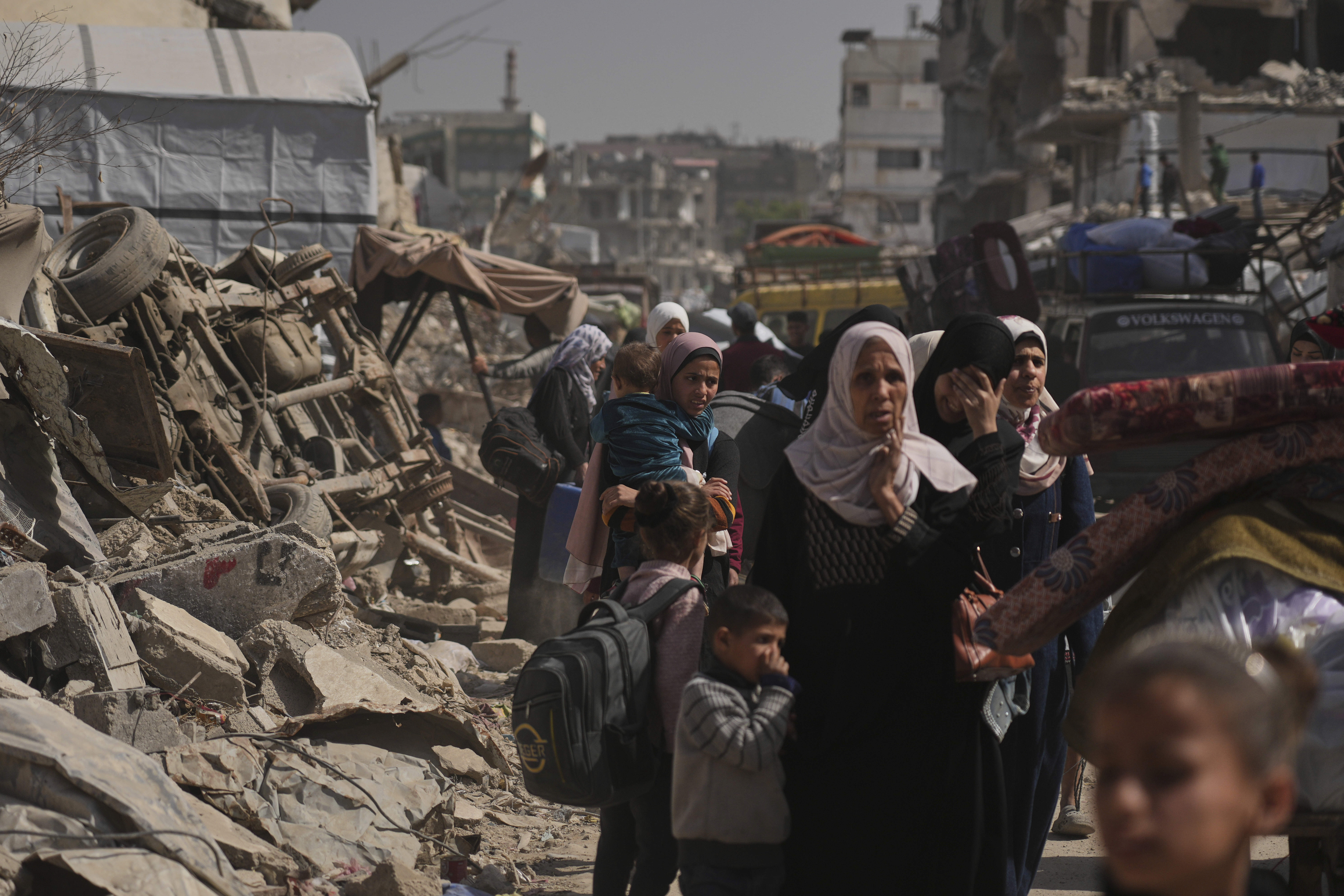Never mind that, by all rights, the unleashing by Israel of new horrors on the people of Gaza did not grab the headlines it deserved, overshadowed as it was by the more spectacular news story of an American president bent on launching a trade war destined to upend the global economy.
Countless people around the world, including that part of it seen as the heartland from which support for Israel emanates, will continue to see the Palestine question as the common house of their politico-moral feelings – as a cause that has come to have a mastering grip on their sensibilities as engaged beings.
And, yes, heavy is both the pride and burden of that engagement.
So, yet another rally was held by these folks, people who, having supped their fill of heart-wrenching images depicting the recent carnage in Gaza, were driven, in the words of Welsh poet Dylan Thomas, to "rage against the dying of the light" in that tormented strip of land.
Yes, their Gaza-fatigue notwithstanding, there are still many people around who feel they must speak up, come what may, lest they become complicit in that which leaves them indifferent.
Earlier this month, scores of buses from at least 50 cities across the US brought thousands of pro-Palestinian protesters to the nation's capital for a large rally where speaker after speaker called on the government to stop its military and diplomatic backing of Israel's war on Gaza.
Without a doubt, the timing was of the essence, for since Israel broke the ceasefire in the wee hours of the morning on March 18, launching massive strikes from naval ships and dozens of warplanes that, in 10 minutes, killed roughly 400 men, women and children. Hundreds of others have perished since then.
If that unspeakable horror was not enough to send people to their streets in protest, what would be?
Truth be told, since day one of the outbreak of war, countless such demonstrations have been held across the globe, in countries as galaxies apart in their cultures as Yemen and Iceland, Indonesia and Brazil, calling for an end to the mayhem, but Israel gave them all the proverbial middle finger, undeterred by UN General Assembly resolutions, by sundry human rights organisations' reports documenting its actions and even by indictments handed down by the International Court of Justice (ICJ) and the International Criminal Court (ICC).

The fatal flaw
Imagining that it will forever have a big power enabler in Washington prepared to cover its back, Israel remains committed to listening to one voice, its own, and to realising its crazed ambitions of hegemony and lebensraum in the Middle East.
We call this hubris, Greek for chutzpah.
Hubris is a recurring theme not only in Greek mythology, where it is seen as a challenge to "the divine order," but also in the collective story of human civilisation, often portrayed by historiographers, all the way from Ibn Khaldun (d.1406) to Arnold Toynbee (d.1975), as a fatal flaw leading to the downfall of the greatest of men and the mightiest of nations.
We are told that in its extreme expression – overconfidence combined with arrogance — hubris can at times lead those consumed by it to a loss of contact with objective reality and a disregard of the implacable laws of history.
It is not a stretch to say that in its hubristic excesses, Israel remains unrivalled in the world today. And if those hubristic ambitions of hegemony and lebensraum it harbours are well known to the world today, it's because Israel has effectively advertised them and even at times flaunted them.
And their pursuit began far back in time with a military campaign called Plan Dalet, an understanding of which is essential today for anyone seeking a penetrative grasp of Israel's end game in both Gaza and the occupied West Bank, territories where Palestinians have lived with Israel's occupying boot over their collective neck for close to six decades.
Pan Dalet, or Plan D, as it is often called, was the blueprint used by Israel's then new army to expel Palestinians from their homes and homeland in 1948, specifying which Palestinian villages, towns and cities should be targeted and giving these troops instructions on how to drive out their inhabitants and destroy their communities.
The consequence of Plan D? As many as 750,000 Palestinians were turned into stateless refugees, with their movable and immovable properties confiscated.
Well, as the tired saying has it, the more things change, the more they stay the same.

Back to the future
Plan D remained a work-in-progress, secretly resurrected – on October 13, 2023, a mere six days after the outbreak of the ongoing war in Gaza — by the Israeli government as a formal document (later leaked by the media) called the Concept Paper, which was essentially a guide on how to ethnically cleanse Gaza of its 2.3 million inhabitants and relocate them to Egypt's Sinai Peninsula.
At a seminal level of relating to it, the war launched by Israel against Gaza was not really a war waged to fight Hamas.
Hamas was ancillary to the war, a pretext to level Gaza — a job it has accomplished on a Carthaginian level – ethnically cleansing it of Palestinians and rebuilding it for its settlers to occupy.
A quick glance at what has taken place north of the enclave in recent months attests to that.
And with no hint of prevarication, Israel has already told the world that a similar fate awaits the occupied West Bank, that other, little remnant of historic Palestine left after the dismemberment of their homeland in 1948 – and the devil with international law and those who enacted it.
Feeling covered by a big power, it will challenge the "divine order" and still get away with it. Overreach? Without a doubt.
Leaders of this big power, like Joe Biden and Donald Trump, are driven by the temper of the times. Times change. You will agree that the national mood in the US has already shown signs of a significant shift in favour of Palestinians when you discover, in an Economist survey released in February, that a mere nine percent of Democrats sympathise with Israel more than with Palestinians.
And, certainly since the war in Gaza broke out, the Palestine question has been central to the public discourse in the US, engaged by intellectuals, ideologues, artists, writers, poets, social critics and others whose voices are seen to have a leading positional value in that discourse.
If, as expected, the Zionist state in Palestine continues to act much as the blood-soaked Crusader kingdom of Jerusalem had done after its establishment in 1099 – an entity bristling with arms but whose survival was underwritten exclusively by support from outremer – then that state is infecting itself with the germ from preordained failure.
Countless tomes have been written about the predictable fate of "failed states" but little about why seemingly "stable states" sometimes irrationally go in search of ways to destroy themselves, a dynamic that Arnold Toynbee, in his monumental, 12-volume work, A Study of History, famously summed up in the maxim, "Civilisations die of suicide, not murder."
This is a dynamic, we are told, that animates the spirit of a hubristic individual as of a community.
So, why, you ask, have Israelis chosen that self-destructive path? Search me. Ask their therapists.



















